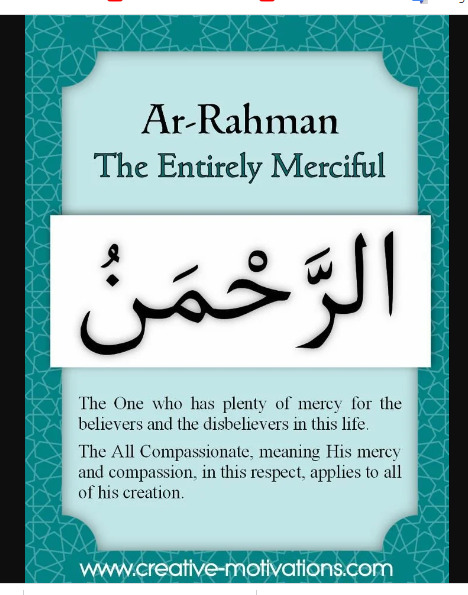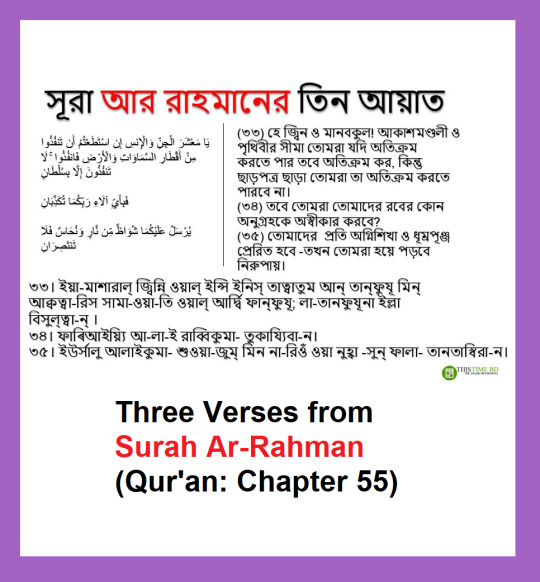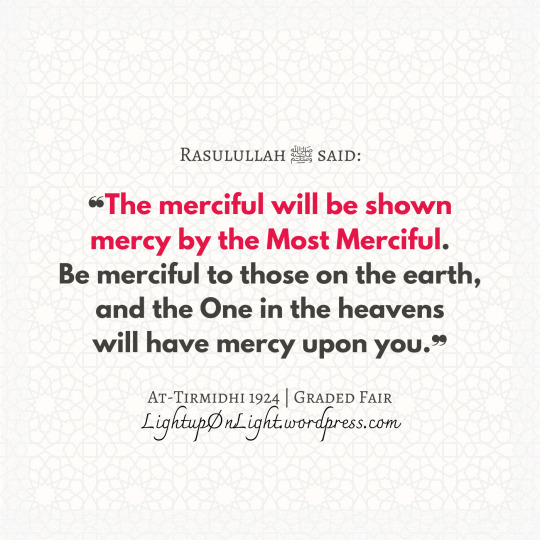#Ar rahman meaning
Photo


সূরা আর-রাহমান
আল্লাহর মহানুভবতা ও ক্ষমাশীলতা
আর রাহমান:
সবচাইতে দয়ালু, পরম দয়াময় , অনন্ত করুণাময়।
আল্লাহ্ তায়ালা আর রাহমান,
অপরিসীম তাঁর দয়ার পরিমাণ।
আল্লাহ্র দয়া ও করুণা রেখেছে ঘিরে,
সৃষ্টিকুলের সকল সৃষ্টিরে।
ইয়া আল্লাহ্! ইয়া রাহমান!
আমাদেরকে দাও পরম কল্যাণ।
https://www.youtube.com/watch?v=zConQjayeeI
#Allah's greatness and forgiveness#Surah Ar Rahman#SurahArRahman#Quran55#Quran 55#Ar Rahman#ArRahman#Allah's greatness#Allah's forgiveness#Allah'sforgiveness#The Most Merciful#TheMostMerciful#ArRahmanmeaning#Ar Rahman meaning#The Ever Merciful.#TheEverMerciful.#Allah'smercy
0 notes
Photo

What is the meaning of Al Rahman?
The Most Merciful, The Entirely Merciful
The name Ar-Rahmaan is most commonly translated as The Most Merciful, The Entirely Merciful, The Most Gracious, The Most Beneficent
Does Rahman mean Merciful?
So, Ar-Rahman means Allah's mercy in general and for all creation, and Ar-Raheem means Allah's compassion and extra mercy especially for the believers
Why is Allah called Al Rahman?
Allah is Ar-Rahmaan (in arabic: ٱلْرَّحْمَـانُ). He is the One who blesses all his creation with prosperity and devoid from disparity. He is most merciful, kind, and loving towards all creation. His Rahma is all inclusive and embraces all.
https://www.youtube.com/watch?v=36CuQo2SDlY
https://www.youtube.com/watch?v=36CuQo2SDlY
#Ar Rahman#The Most Beneficent#Who is Ar Rahman#arahman#Ar rahman meaning The Most Beneficent#Ar rahman meaning#99 Names of Allah#AsmaWasSifat#asmaul husna#Allah;s Names#Al Rahman#Ar-Rahmaan#the meaning of Al Rahman
0 notes
Text
ok so somehow i ended in the rabbit hole of oscar winning composers and im going through the list and i remember ar rahman winning once and thinking then "oh. wow okay congratulations but im pretty sure ive hear much better stuffs from you" and i may sound so demeaning right now and no disrespect to the oscar winners at all but im 100% sure all of ar rahmans movies ended up getting oscar recognition, he would be sweeping em lot every fucking year
#i mean.. dude just lacks exposure#or the world lacks exposure to him and honestly the world is losing on that part#ar rahman#oscars
1 note
·
View note
Photo


সূরা আর-রাহমান
আল্লাহর মহানুভবতা ও ক্ষমাশীলতা
আর রাহমান:
সবচাইতে দয়ালু, পরম দয়াময় , অনন্ত করুণাময়।
আল্লাহ্ তায়ালা আর রাহমান,
অপরিসীম তাঁর দয়ার পরিমাণ।
আল্লাহ্র দয়া ও করুণা রেখেছে ঘিরে,
সৃষ্টিকুলের সকল সৃষ্টিরে।
ইয়া আল্লাহ্! ইয়া রাহমান!
আমাদেরকে দাও পরম কল্যাণ।
https://www.youtube.com/watch?v=zConQjayeeI
#Allah's greatness and forgiveness#SurahArRahman#Quran 55#Quran55#Ar Rahman#ArRahman#Allah's greatness#Allah'sgreatness#Allah'sforgiveness#Allah's forgiveness#ArRahman meaning#ArRahmanmeaning#Allah'smercy#TheEverMerciful.#TheEver Merciful.#The Most Merciful#TheMostMerciful
0 notes
Text
SUBHAN'ALLAH, THIS TEXT CONTAINS VERY INFORMATIVE KNOWLEDGE FOR ALL!! READ & SPREAD IT AS MUCH AS POSSIBLE, IT WILL BE SADQA-E-JARIAH FOR YOU AND ME.
1-Akhi - Brother
2-Ukhti - Sister
3-JazakAllah khair - May Allah give you Ajar/Sawab for your deed.
4-Ma'Shaa'Allah - As God has willed.
5-HayakAllah - May Allah give you life.
6-BarakAllahu Feek - May Allah put baraka in what you are doing.
7-Wa feeka barakallahu - and May Allah bless you. (in response to Barakallahu Feek)
8-Wa iyyakum - And to you
9-Alhamdulillah - Praise be to Allah
10-Allah - God
11-Allahu Akbar - Allah is Most Great
12-Amanah - Trust
13-Assalamu Alaikum - Peace be upon you--the "official" Islamic greeting.
14-Assalamu Alaikum wa Rahmatullahi wa Barakatuh - "Peace and the Mercy and Blessings of God be upon you" Extended form of the above.
16-Astaghfir Allah - I seek forgiveness from Allah (used when mentioning something that goes against the standards of Islam)
17-Ayah/Ayat - Qur'anic verse
18-Bid`ah - Innovation, addition to the religion's essentials
19-Bukhari - One of the most noted compilers of hadith. His collection is 20-known as Sahih Bukhari
21-Bismillah ar-Rahman ar-Rahim - In the Name of Allah, the Most Gracious, Most Merciful
23-Da'wa - Invitation (for humankind to Islam)
24-Du`aa - Supplication
25-Eid - Islamic holiday
26-Fatwa - Islamic legal ruling
27-Fiqh - Islamic law as interpreted by scholars
28-Fitnah - Corruption and disorder, also temptation
29-Hadith - A report of a saying or deed of the Prophet
30-Haj - Pilgrimage
31-Halal - Allowed (per Islamic law)
32-Haram - Forbidden (per Islamic law)
33-Hazrat/Hadrat - Honorable
34-Hijab - Modest way of behavior and dress (including head scarf for women)
35-Imam - Leader
36-Iman - Faith
37-In Shaa Allah - If God wills. (Used when talking about a future event)
38-Injeel - The scripture sent down to Prophet Issa (Jesus)
39-Isnad - Chain of transmitters, the list of people who successively narrated a given hadith
40-Jannah - Paradise
41-JazakAllah Khair - May God grant you what is good. (Often used instead of "Thank you")
42-Jihad - Striving for Islam, whether by peaceful or violent means
43-Jinn - Unseen beings, who, like humans, are given the power to choose between right and wrong
44-Kafir - One who denies the truth. Literally, one who "covers" the truth (sometimes applied to non-Muslims).
45-Khalifah - Caliph: Leader of Muslim nation
46-Khilafah - Caliphate
47-Khutba - Sermon
48-Kufr - Denial of the Truth, rebellion against God
49-La Ilaha Illa Allah - There is no deity but God
50-Ma Shaa Allah - What God has willed! (Usually used to express wonder at Allah's creation)
51-Madhhab - School of jurisprudential thought
52-Makruh - Detested, but not forbidden (per Islamic law)
53-Mandoub - Recommended, but not required (per Islamic law)
54-Mubah - Neither forbidden nor commended. Neutral (per Islamic law)
55-Mushrik - One who commits Shirk
56-Muslim - One who submits to Allah and is a follower of Islam; also, name of one of the most notable hadith scholars. His collection is known as Sahih Muslim
57-Nabi - Prophet
58-Qur'an - The Words of Allah conveyed to us by the Prophet
PBUH - Peace Be Upon Him. Same as SAW
59-RAA - (Radia Allahu Anhu/Anha.) May Allah be please with him/her
60-Ra-sool - Messenger (Prophet to whom a scripture is revealed)
61-Rasool Allah - Messenger of God (used to refer to Prophet Muhammad)
62-Sahaba - Companions of Prophet. Singular is "Sahabi"
63-Sahih - "Sound in isnad." A technical attribute applied to the "isnad" of a hadith
64-Salaam - Peace. An abbreviated version of the Islamic greeting
65-Salaat - Prayer
66-SAW - (Salla Allahu Alaihi Wa Sallam.) Peace Be Upon Him
67-Sawm/Siyam - Fasting
68-Seerah/Sirah - History of the Prophet's life
69-Shahadah - Bearing witness that there is no god but Allah and that Muhammad is His Messenger.
70-Shari'ah - Divine Law
71-Sheikh - Scholar (or any elder and/or respected man)
72-Shirk - Associating partners (e.g. helpers, other gods) with Allah
73-Shura - Consultation among Muslims
74-Subhan Allah - "Glory be to God"
75-Sunna/Sunnah - Tradition of the Prophet
76-Surah/Sura - A Chapter in the Qur'an
78-Tafsir - Interpretation
79-Tawraat - The scripture sent down to Prophet Musa (Moses).
80-Ulama - Religious scholars
81-Umma - Nation, community.
82-Ustadh - Teacher
83-Wassalaam - And peace. It means "goodbye"
84-Zakat - Required charity
103 notes
·
View notes
Text
i am, simply, a imtiaz ali whore. this day 8 years ago he gave us one of the greatest movies of all time ---- tamasha. not everyone will relate to tamasha, but if you do take a hug, man. whether you relate to ved, tara or even the auto driver tamasha teaches us something new everytime we watch it. it's a shame the box office failed to recognize and cherish such a gem of a movie. imtiaz ali's vision put to life by ranbir's stellar performance and accompanied by ar rahman's soulful music, i mean is anymore explanation or reason to love this movie needed!?



picture : pinterest
#desiblr#movies#bollywood#tamasha#ranbir kapoor#imtiaz ali#desi aesthetic#indian cinema#alia bhatt#ar rahman#music#jab we met#desi things#desi tumblr#movie review#movie recommendation#reviews
90 notes
·
View notes
Text



This is Yazan a 12 year old boy living in Gaza. Yazan has 4 brothers and a sister. The occupation has destroyed their home and their dreams. Yazan has dreams of finishing school and becoming a doctor.
Yazans older brother Shadi created a gofund me page to help raise funds to evacuated his family out of gaza via the rafa border.
If you have the means please consider donating to their go fund me. If you want to support but cant donate please share.
I want to see Yazan grow up with his family and finish school to become a Doctor.
#kiggu mew#digital art#art#artists on tumblr#illistration#digital artist#digital drawing#cute#doodle#digital atist#free gaza#free palestine#gaza strip#support#gofundme#go fund them#save rafah#all eyes on rafah#rafah
21 notes
·
View notes
Text
Thinking about how because of the zeroth law the night sky is supposed to be white as it’s a closed system but alas it is not because it is constantly expanding, the universe is constantly expanding and entropy hasn’t had the time to catch up, if it was any other way the sky would be white and not black. Isn’t that so jarring to think about? It’s something physics couldn’t explain properly or fully.
In multiple ayahs in the Quran, Allah tells us how He is the one who alternates between night and day and specifically in 51:47 subhanAllah He also literally tells us the universe is constantly expanding:
وَٱلسَّمَآءَ بَنَيْنَـٰهَا بِأَيْي۟دٍۢ وَإِنَّا لَمُوسِعُونَ
“We built the universe with ˹great˺ might, and We are certainly expanding ˹it˺.”
وَٱلسَّمَاۤءَ is used here meaning the sky also. The sky is literally constantly expanding AND BECAUSE OF THIS the sky transitions ever so beautifully into dusk and night. Guys…Allah SWT literally gifted us a blanket????? And night lights and a lamp too!!!!!
“Blessed is the One Who has placed constellations in the sky, as well as a 'radiant' lamp and a luminous moon.” [25:61]
He gifted us the most plush and beautiful and perfect blanket. The night sky. To tuck us all in every night and aid in our good slumbers. Truly everyday you find more and more of Allah’s blessings.
“And He has subjected for your benefit the day and the night, the sun and the moon.” [16:12]
Allah SWT truly is Ar-Rahman. “If you tried to count Allah’s blessings, you would never be able to number them. Surely Allah is All-Forgiving, Most Merciful.” [16:18]
Sleeping tonight thankful to Allah for gifting us this blanket because I’m not sure what I would do if my sleep conditions consisted of a white sky…!?!? Alhumdillah for everything I have always.
#reflections from the quran#i apologize if I’m wrong on the physics end it’s been a minute since#muslim blogging#m’s mind
10 notes
·
View notes
Text
Sol- Song analysis
(The first of many collabs by @thegleamingmoon and myself)
Song name : Sol
Composer : AR Rahman
Movie : Ponniyin Selvan - 1
The captivating female characters of PS have always managed to delight our hearts. One of the points to highlight in the novel as well as the movie has been the endearing bond of friendship between the Chozha princess Kundavai and the Kodumbalur princess Vaanathi, which has been beautiful portrayed in the song 'Sol',a lilting melody from the movie PS-1.
The song starts with the princesses sweetly singing and dancing in a swan shaped boat which moves merrily letting them enjoy the gentle embrace of nature. In a happy mood,these princesses sing a song,teasing each other in the names of their future lovers (who are Vanthiyadevan and Arulmozhi respectively) but what's surprising is how they predict it aptly.
Lyrics :
Kadhodu sol,kadhodu sol,
Yaarendru sol,
Yaar endru sol.
Tell me in whispers,tell me in whispers,
Tell (me) who is he,tell who is he
Perazhagan ah sol,
Kodharmugan ah sol,
Is he the handsomest of them all?
Is he tall like the highest peaks?
(Here,the former is referred to Arulmozhi Varmar since 'Perazhagan' is a title given to Raja Raja Chozhan' while Kodharmugan can be referred to Vanthiyadevan.)
Maaveerana sol,
Vaaijaalana sol
Is he the bravest of them all?
Does he have his way with words?
(Here,'Maaveeran' is most definitely Arulmozhi while 'Vaaijalan' can be none other than our Vanthiyadevan for him getting away with this talent of his is no hidden fact)
Oodathae solladi
Oor varthai sol
Oh dear don't blush away,
Tell (me) atleast a word (about him)
Kaavalan ah sol
En yevalan ah sol
Poraali ah sol
Illae ododi ah sol
Is he a guardian?
Or is he (my) messenger?
Is he a fighter,
(Or) is he the one who runs away?
[ Here,the former is most definitely Arulmozhi for he describes himself to be a 'Kaavalan' just a short while later in the movie, while the latter is Vanthiyadevan for being a messenger is his prominent role in most parts of the book as well as the movie ]
Keechu kural ah sol
Kaviarasu ah sol
Ippodhae sol
Adi ingaeye sol
Does he have a screechy/chirpy voice?
Is he the king of poets?
Tell me now oh dear,
Tell me right here.
[ ‘Keechu kural’ means a screechy voice but can also mean chirpy which is Vanthiyadevan in both the cases for both, his sometimes loud and sometimes humorous behaviour while ‘Kaviarasu' is definitely Raja Raja Chozhan for his love for poetry and for his qualities being the centre of the world of poets as well. ]
Mayaiya sol
Maayana sol
Is he an illusion?
Or is he a trickster?
[ 'Maayai' or the one who can weave illusions can be Vanthiyadevan while 'Maayan' is most definitely Arulmozhi Varmar for he is too good to be true, especially for Vaanathi. ]
Kaadhodu Sol,kaadhodu sol
Yaarendru sol,
Yaar endru sol
Tell me in whispers,tell me in whispers,
Tell (me) who is he,tell who is he?
What do you guys think? @vibishalakshman @thelekhikawrites @chiyaanvikram @hollogramhallucination @nspwriteups @kovaipaavai @rang-lo @dumdaradumdaradum @willkatfanfromasia @whippersnappersbookworm @yehsahihai @ragalata Please tag whoever I missed.
57 notes
·
View notes
Note
Whats your opinion on Caliph Ibd(might be Ibn, cant remember) Al Raman II of Al Andalus?
Do you mean Abd ar-Rahman II? He was the Caliph of Al-Andalus and Emir of Córdoba in the 800s
I genuinely can't find Al Raman II might've been misspelled
7 notes
·
View notes
Photo


সূরা আর-রাহমান
আল্লাহর মহানুভবতা ও ক্ষমাশীলতা
আর রাহমান:
সবচাইতে দয়ালু, পরম দয়াময় , অনন্ত করুণাময়।
আল্লাহ্ তায়ালা আর রাহমান,
অপরিসীম তাঁর দয়ার পরিমাণ।
আল্লাহ্র দয়া ও করুণা রেখেছে ঘিরে,
সৃষ্টিকুলের সকল সৃষ্টিরে।
ইয়া আল্লাহ্! ইয়া রাহমান!
আমাদেরকে দাও পরম কল্যাণ।
https://www.youtube.com/watch?v=zConQjayeeI
#Allah's greatness and forgiveness#Surah Ar Rahman#Allah'sforgiveness#ArRahmanmeaning#ArRahman meaning#Quran 55#Quran55#ArRahman#Allah'sgreatness#Allah'smercy#TheMostMerciful#TheEverMerciful.
0 notes
Text

Some of the themes of Surah Al-Mulk are about Sovereignty and Kingship. When these two are placed in mankind’s hands, he becomes haughty and self-serving, and he transgresses the limits of Allah.
There is a quote that says power tends to corrupt, and absolute power corrupts absolutely. Indeed, it is difficult to control oneself when a person has a greater power or status above others. This is why our Deen teaches us not to purposely seek out for it:
It was narrated that Sa‘d ibn Abi Waqqas was with his camels when his son ‘Umar came to him. He dismounted, and said to him: ❛You are busy with your camels and sheep, while you have left the people contending with one another for kingship?❜ So Sa‘d struck him on the chest, and said: ❛Be quiet! I heard Rasulullah [salla Allahu ‘alayhi wa sallam] said:
🌺 ❛Allah loves the servant who is pious, independent of means, and hidden from the people.❜ 【Sahih Muslim 2965】
And Sheikh al-Uthaymin rahimahullah said:
🌿 ❛The one who is hidden from the people is the one who does not try to be prominent and known, and he is not interested in becoming prominent before people, or being pointed out, or having people talk about him. You will find him going from his house to the mosque, and from the mosque to his house, and from his house to visit his relatives and brothers, keeping a low profile.❜ 【Sharh Riyad as-Saliheen】
Another tadabbur gem when we study Surah Al-Mulk, a Surah that tells us about Allah’s Sovereignty, we'll notice that the Surah also mentions the Name Ar-Rahman multiple times in a span of just 30 aayat. Teaching us that Allah subhanahu wa ta'ala is Al-Malik, but He is also Ar-Rahman.
This is an important point of reflection. Let it be a reminder to those who have been given some sort of power, wealth, status, intellect over others to be merciful to one another. Use hikmah in our dealings with others. The more prominent we are, the more people look up to us, the bigger impact our character has in our community.
Your sister in Deen,
Aida Msr ©
9 notes
·
View notes
Text
This was the only scene in the movie with just the two of them and it served. I mean, come on, the way he smirks when he figures out that it's the princess all along. My man's whipped!
She's so gone for the spy! I wish every single one of their interactions from the books made its way to the big screen; there's this reverence that weaves through him when he's with his princess.
When has AR Rahman disappointed us with the soundtracks?!?!
20 notes
·
View notes
Text
If AR Rahman doesn't get all the awards for PS2 background score, I will RIOT.
Like, unlike PS1, I didn't listen to this album religiously right after audio launch because most of the music seemed like they were bgms rather than actual songs and I figured I needed context to get the full extent of the meaning of his music and man, was I right. After watching the movie, I realized every single track was absolute genius and I can't stop listening and FEELING. OOF.
Nobody could have done this like ARR. ABSOLUTELY NOBODY!
31 notes
·
View notes
Text
ISLAM 101: AN INTRODUCTION TO HADITH: Part 14
Sila ar-Rahm (Observing Ties of Kinship): Part 1
Abu Hurayra said:
“A man came to the Messenger of Allah, may Allah bless him and grant him peace, and asked, ‘Messenger of Allah, that person are the most entitled to the best of my company?’ He answered, ‘Your mother.’ He asked, ‘Then whom?’ He said, ‘Your mother.’ He asked, ‘Then whom?’ He said, ‘Your mother.’ He asked, ‘Then whom?’ He said, ‘Your father.’”
(Sahih al-Bukhari, Adab, 2; Sahih Muslim, Birr, 1. See also: Sunan ibn Majah, Wasaya, 4; Sunan Abu Dawud, Adab, 120; Sunan at-Tirmidhi, Birr, 1).
NARRATOR
Abu Hurayra
His name is Abdu’r-Rahman ibn Sakhr. During the Age of Ignorance, his name was Abd ash-Shams (Servant of the Sun). The Messenger of Allah named him Abdu’r-Rahman (and according to other narrations, Abdullah or others). He himself explained why he was given the nickname Abu Hurayra: “I had found a cat and used to carry it with me. For this reason, I came to be known as Abu Hurayra (literally meaning, ‘Father of Kitten’).”
He became Muslim during the Battle of Khaybar, coming to Medina from Yemen (629 CE).
He was one of the leading figures of the Suffa Companions.
He possessed a strong memory and great intelligence.
He is distinguished among the Companions as having the greatest command of and narrating the most hadith. He has narrated 5,374 hadiths.
He is distinguished in hadith narration.
Abu Hurayra passed away in Medina (676 CE), aged seventy-eight years.
EXPLANATION
Allah the Almighty has emphasized kindness to parents and observing the ties of kinship in various sections of the Qur’an and has warned human beings in this regard. Moreover, at times even placing the rights of parents above all else, He has enumerated it immediately after commanding human beings not to associate partners with Him.
And (as the essential basis of contentment in individual, family and social life,) worship Allah and do not associate anything as a partner with Him; and do good to your parents in the best way possible, and to the relatives, orphans, the destitute, the neighbor who is near (in kinship, location, faith), the neighbor who is distant (in kinship and faith), the companion by your side (on the way, in the family, in the workplace, etc.), the wayfarer, and those who are in your service. (an-Nisa 4:36)
In due reverence for Allah, keep from disobedience to Him in Whose Name you make demands of one another, and (duly observe) the rights of the wombs (i.e. of kinship, thus observing piety in your relations with Allah and with human beings). (an-Nisa 4:1)
Your Lord has decreed that you worship none but Him alone, and treat parents with the best of kindness. Should one of them, or both, attain old age in your lifetime, do not say “Ugh!” to them (as an indication of complaint or impatience), nor push them away, and always address them in gracious words. Lower to them the wing of humility out of mercy, and say: “My Lord, have mercy on them even as they cared for me in childhood.” (al-Isra 17:23-24)
Obedience to parents is an important duty to which Allah gives great weight and which is second only to belief in His Unity, such that He exhorts human beings in this immediately after decreeing that they worship none but Him. It is inconceivable for those who are not careful in observing the rights of their parents, who have favored them with innumerable kindness, to duly observe the rights of others. The Messenger of Allah states that the person most deserving of the best treatment and conduct is the mother, to such an extent that they are three times more deserving of such benevolence than the father. This is because, compared to the father, the mother assumes the three added responsibilities of carrying the child for nine months during pregnancy, giving birth, and nursing them, among other arduous duties.
Again, as reported by Abu Hurayra, the Messenger of Allah said:
“What a loss for him! What a loss for him! What a loss for him!” Someone asked: ‘Who, O Allah’s Messenger?’ He replied: ‘He whose parents reach old age, either one or both of them, but he does not enter Paradise.’” (Sahih Muslim, Birr 9, 10).
Notwithstanding the age of their parents, a child is obligated to fulfill their duties towards them. They may be wealthy and not be in need of the financial assistance of their children. They may even have personal carers or employees attending to their daily chores. What falls upon the child in such a circumstance is to please them and to fulfill whatever needs they may have. Money is not everything. An affectionate glance, a heartfelt gesture, and a loving embrace are not things that can be bought with money.
Abu Hurayra again reports that Allah’s Messenger said:
“A child cannot repay his father unless he finds him as a slave and the buys him and sets him free.” (Sahih Muslim, Itk, 25. See also: Sunan Abu Dawud, Adab, 120; Sunan at-Tirmidhi, Birr, 8; Sunan ibn Majah, Adab, 1).
#Allah#god#islam#quran#muslim#revert#revert islam#convert#convert islam#converthelp#reverthelp#revert help team#help#islam help#salah#dua#prayer#pray#reminder#religion#mohammad#muslimah#hijab#new muslim#new revert#new convert#how to convert to islam#convert to islam#welcome to islam
4 notes
·
View notes
Text
Notes on Surah Al-Fatihah
• Ar-Rahman (الرحمان) and Ar-Raheem (الرحيم) come from the root R-H-M/ر-ح-م which means to have mercy, tenderness, kindness, gentleness, pity, and to have all that is required to bestow such.
• Multiple names indicate a noble status: Al-Fatihah (The Opening), Fatihat Al-Kitab (The Opening Of The Book), Umm Al-Kitab (Mother Of The Book), As-Sab Al-Mathani (The Seven Oft Repeated), Surah As-Salah (The Surah Of Prayer), Surah Ar-Ruqyah (The Surah Of Ruqyah), Ash-Shifa (The Cure), Al-Hamd (The Praise)
• Rabb (رب): Meaning the One and Only Lord for all the universe, its Creator, Owner, Organizer, Planner, Master, Sustainer, Provider, Cherisher, and Giver of Security
• There are two types of guidance: Guidance of Taufiq which is solely from Allah ﷻ and Guidance of Irshad which is guidance through dawah.
• All three types of Tawhid are included: Tawhid Ar-Ruboobiyyah (oneness of divine Lordship), Tawhid Al-Uloohiyyah (oneness of divinity) and Tawhid Al-Asma’ Wa’s-Sifaat (oneness of the divine names and attributes).
• “The Opening of the Book, the Essence of the Qur’an, the seven oft-recited verses, the complete healing, the beneficial remedy, the perfect ruqyah, the key to independence of means and success, the preserver of strength, that wards off worry, distress, fear and grief, is for the one who appreciates its value and gives it its due, and tries to apply it in the proper manner to treat his sickness, and knows how to seek healing and treat sickness with it.” -Ibn Al-Qayyim
6 notes
·
View notes